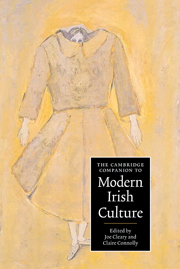Book contents
- Frontmatter
- 1 Introduction: Ireland and modernity
- Part I Cultural politics
- Part II Cultural practices and cultural forms
- 9 Modernism and the Irish revival
- 10 Poetry in Ireland
- 11 Irish sport
- 12 Projecting the nation: cinema and culture
- 13 Folk culture
- 14 Irish prose fiction
- 15 Irish music
- 16 Modern architecture and national identity in Ireland
- 17 The visual arts in Ireland
- 18 Irish theatre
- Index
18 - Irish theatre
from Part II - Cultural practices and cultural forms
Published online by Cambridge University Press: 28 May 2006
- Frontmatter
- 1 Introduction: Ireland and modernity
- Part I Cultural politics
- Part II Cultural practices and cultural forms
- 9 Modernism and the Irish revival
- 10 Poetry in Ireland
- 11 Irish sport
- 12 Projecting the nation: cinema and culture
- 13 Folk culture
- 14 Irish prose fiction
- 15 Irish music
- 16 Modern architecture and national identity in Ireland
- 17 The visual arts in Ireland
- 18 Irish theatre
- Index
Summary
Considered from the perspective of the early twenty-first century, when plays by Irish writers can be seen on stages from Los Angeles to Warsaw, it is difficult to imagine Irish culture without the theatre. However, if we turn back to the first major histories of the Irish theatre, published in the closing decades of the eighteenth century, we find them troubled by an awareness that the theatre does not fit easily into the prevailing definitions of Irish culture.
This problem is best defined by one of the foundational works of Irish theatre history, Joseph CooperWalker’s ‘An Historical Essay on the Irish Stage’, published by the Royal Irish Academy in 1788.Walker was a respected antiquarian who had published his ‘Historical Memoirs of the Irish Bards’ two years earlier. He was one of a number of antiquarians and historians of the period who sought to recover indigenous forms of Irish architecture, music, poetry, graphic design, sports, clothing and civil law. In all of these areas, the ancient Irish past seemed to be an almost inexhaustible source, connecting the emerging modern nation with an authenticating history. ‘Can that nation be deemed barbarous in which learning shared the honours next to royalty?’ asks Walker in one of the more passionate moments in his ‘Memoirs of the Irish Bards’. ‘Read this, ye polished nations of the earth, and blush!’1 However, when Walker and his contemporaries looked for traces of theatre in Irish antiquity, they found nothing. ‘It is very extraordinary that we cannot discover any vestiges of the Drama amongst the remains of the Irish Bards’, comments Walker. ‘If the Stage ever existed in Ireland previous to the middle ages, like the “baseless fabric of a vision” it has melted into air, leaving not a trace behind.’
- Type
- Chapter
- Information
- The Cambridge Companion to Modern Irish Culture , pp. 322 - 338Publisher: Cambridge University PressPrint publication year: 2005
- 2
- Cited by



